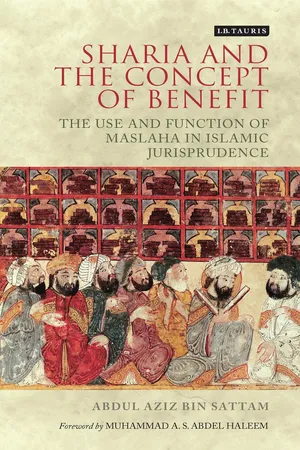Chapter One
WHAT IS MAṢLAḤA?
1. The Definition of Maṣlaḥa: Linguistic and Terminological
The Arabic term maṣlaḥa (pl. maṣāliḥ) finds its root in the verbal noun al-ṣalāḥ (righteousness), which in turn is the antonym of al-fasād (corruption). Its primary signification is of ‘benefit’. Aṣlaḥa, meaning to restore something after it has been corrupted, is a verbal form of the term.1 Thus, in linguistic terms, the word maṣlaḥa may generally be applied in one of two ways. The first is to describe an object, or action, as ‘being perfectly suitable for something’. For instance, a pen could be described as a maṣlaḥa when it is perfectly suitable for writing. The second, which is a figurative usage of the word maṣlaḥa, is to indicate an action as bringing benefit or preventing harm. For example, seeking knowledge is a maṣlaḥa in that it results in certain benefits.
The word mafsada is the antonym of maṣlaḥa, a factor that creates some limitations upon their joint usage. The terms cannot be jointly and concurrently employed to describe the same thing and to the same degree. Correspondingly they cannot be simultaneously removed from the description of something such that it is described as neither maṣlaḥa nor mafsada at the same time and to the same degree. As benefit is also the antonym of harm, the removal of harm is itself a maṣlaḥa.2
Istiṣlāḥ is to seek maṣlaḥa, while the verbal form istaṣlaḥtu, means ‘I have sought what is beneficial.’ According to al-Ghazālī (d. 505 AH), the original meaning of maṣlaḥa as a technical religious term is to secure a benefit or remove a harm. However, the medieval theologian saw an alternative meaning to be of a more particular relevance: that of the preservation of the Sharīʿa objectives. Al-Ghazālī states,
He then goes on to clarify that in his view the objectives of the Islamic Sharīʿa are five: preservation of religion, life, reason, offspring and property. Al-Ghazālī suggests that whatever assures the preservation of these five represents a maṣlaḥa and whatever fails to preserve them is a mafsada, the removal of which is a maṣlaḥa in itself.
Al-Ghazālī indicates that maṣlaḥa is of three types: ḍarūriyyāt (necessities), hājjiyyāt (needs) and taḥsīniyyāt (complements). He further explains that maṣlaḥa at both the levels of hājjī and taḥsīnī cannot be judged by the process of istiṣlāḥ alone, unless supported by an original textual precedent, otherwise legislation will be based on mere personal opinion. However, once supported by an original precedent, it becomes a qiyās (analogy). As for those classified as ḍarūriyyāt (necessities), al-Ghazālī asserts that maṣlaḥa must be reached through ijtihād (personal reasoning) made by a mujtahid (a scholar qualified to make ijtihād) but there is no need for the presence of an original precedent.
According to al-ʿIzz b. ʿAbd al-Salām (d. 660/1 AH),4 maṣlaḥa is either the benefits and pleasures or their causes. As such, he classifies it into two categories: the first is the genuine literal form, that is the pleasures themselves. The second is allegorical, or the causes of such pleasures.5 Ibn Taymiyya defines maṣlaḥa as ‘the action that brings a preponderant benefit not declined by the Sharīʿa’.6 Al-Lakhmī defines maṣlaḥa as ‘the benefit that the All-Wise Legislator has intended for His servants: the preservation of their faith, life, intellect, offspring and property, according to a specific order’.7 It would appear al-Lakhmī was influenced by al-Rāzī (d. 606 AH)8 as we find the latter, in his work al-Maḥṣūl, defining al-munāsib (the suitable) as:
As achieving a decision within the framework of the Sharīʿa is intended to achieve the greatest level of benefit, perhaps the most appropriate definition for maṣlaḥa in this study is as follows: ‘The best option that achieves the optimum desired benefit, while avoiding contravention of the Sharīʿa.’
2. The Sharīʿa and Securing People’s Maṣlaḥas
From the Islamic perspective, God created people and did not leave them without managing their affairs. Rather, He assisted them with His messengers and revealed to each His law (Sharīʿa), the obedience to which results in guidance away from the darkness of misguidance. The Qur’an, which is understood by Muslims to be God’s word, indicates that such is the case with every Sharīʿa and that its application extends to all nations in all times, from the creation of Adam to the Day of Resurrection:
Islamically, Sharīʿa aims to secure and maximize benefits, preventing and minimizing harms in the best and fairest way possible and in avoidance of any contradiction or confusion. It is argued within Musl...
